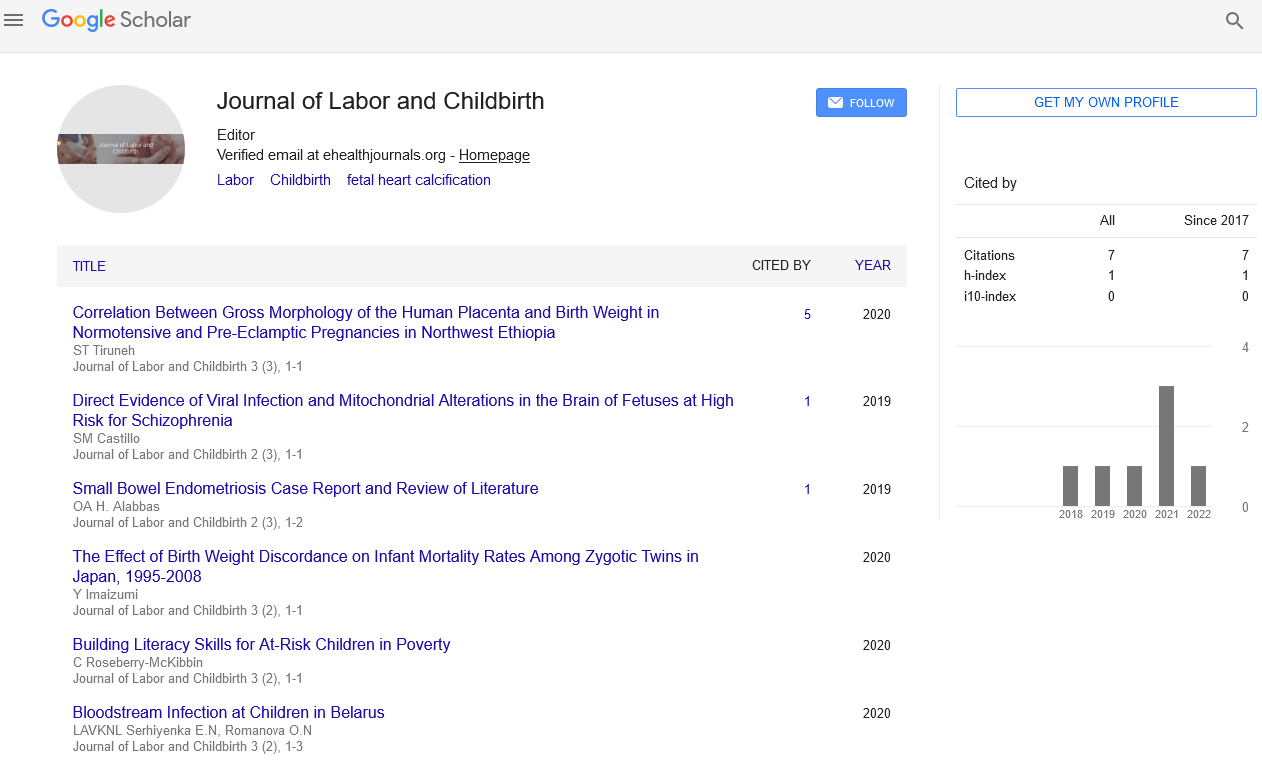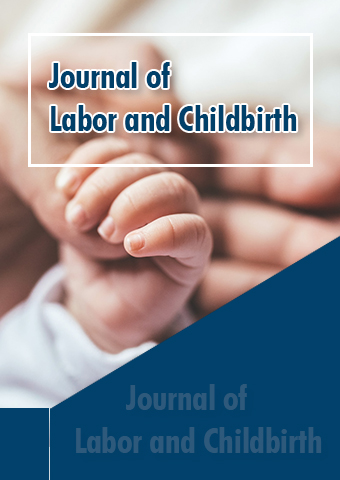Perspective - Journal of Labor and Childbirth (2024) Volume 7, Issue 3
Understanding Fetal Heart Calcification: Causes, Diagnosis and Implications
- Corresponding Author:
- Nita Bharti
Department of Child Support Services,
Shewn University,
Austin,
United States
E-mail: nita@psu1.edu
Received: 09-May-2024, Manuscript No. jlcb-24-134442; Editor assigned: 14-May-2024, PreQC No. jlcb-24-134442 (PQ); Reviewed: 28-May-2024, QC No. jlcb-24-134442; Revised: 14-Jun-2024, Manuscript No. jlcb-24-134442 (R); Published: 22-Jun-2024, DOI: 10.37532/ jlcb.2024.7(3).217-218
Introduction
The miracle of life begins with the development of the fetus in the womb, a process intricately governed by various biological mechanisms. However, this journey is not without its challenges. Fetal heart calcification, a rare but significant condition, poses concerns for both expectant parents and medical professionals. In this article, we delve into the causes, diagnosis and implications of fetal heart calcification, shedding light on this complex phenomenon.
Description
Understanding fetal heart calcification
Fetal heart calcification, also known as cardiac calcification, refers to the abnormal deposition of calcium in the developing heart of the fetus during pregnancy. This condition can manifest in different forms, including myocardial calcification, valvular calcification and pericardial calcification, each presenting its unique set of challenges.
Causes
The etiology of fetal heart calcification is multifactorial, often involving a combination of genetic predisposition and environmental factors. In some cases, maternal health conditions such as diabetes mellitus, hypertension and autoimmune diseases can increase the risk of fetal cardiac calcification. Additionally, certain medications and exposures to toxins or infections during pregnancy may also play a role in the development of this condition.
Genetic factors contribute significantly to fetal heart calcification, with mutations in genes responsible for calcium metabolism and cardiac development implicated in its pathogenesis. For example, mutations in the NOTCH1 gene have been associated with aortic valve calcification, highlighting the genetic basis of this condition.
Diagnosis
Detecting fetal heart calcification poses a challenge due to its rarity and the limitations of current prenatal screening techniques. Ultrasonography remains the primary diagnostic tool for evaluating fetal cardiac abnormalities, including calcification. During routine prenatal ultrasound examinations, the presence of echogenic foci within the fetal heart may raise suspicion for cardiac calcification.
In cases where fetal heart calcification is suspected, additional imaging modalities such as fetal echocardiography and Magnetic Resonance Imaging (MRI) may be employed to further evaluate the extent and severity of the condition. These advanced imaging techniques allow for a detailed assessment of cardiac anatomy and function, enabling healthcare providers to formulate appropriate management strategies.
Implications
The presence of fetal heart calcification can have significant implications for both the fetus and the expectant parents. Depending on the severity and location of the calcification, it may adversely affect cardiac function and lead to complications such as heart failure, arrhythmias and structural abnormalities.
For expectant parents, the diagnosis of fetal heart calcification can evoke a range of emotions, including anxiety, fear and uncertainty about the health and well-being of their unborn child. It may also necessitate difficult decisions regarding pregnancy management, including the consideration of fetal interventions or therapeutic options.
Management and treatment
The management of fetal heart calcification requires a multidisciplinary approach involving obstetricians, maternal-fetal medicine specialists, pediatric cardiologists and genetic counselors. The goals of management are to monitor fetal well-being, assess the progression of the condition and provide appropriate interventions to optimize outcomes.
In cases where fetal heart calcification is detected, close surveillance with serial ultrasound examinations is essential to monitor fetal growth and cardiac function. Maternal health optimization, including the management of underlying medical conditions, is also crucial to minimize the risk of complications and improve fetal outcomes.
In select cases, fetal intervention may be considered to address specific abnormalities or complications associated with cardiac calcification. These interventions may include fetal cardiac catheterization, in utero cardiac surgery or the administration of medications to mitigate the effects of calcification on cardiac function.
Prognosis
The prognosis of fetal heart calcification varies depending on various factors, including the underlying etiology, the extent of calcification and the presence of associated anomalies. While some cases may resolve spontaneously or remain asymptomatic, others may progress to more severe forms of cardiac dysfunction requiring intensive medical intervention.
Long-term outcomes for infants born with fetal heart calcification may also be influenced by the presence of associated congenital heart defects, neurodevelopmental abnormalities, and other comorbidities. Early detection, timely intervention and comprehensive multidisciplinary care are crucial in improving outcomes and optimizing the quality of life for affected individuals.
Conclusion
Fetal heart calcification represents a rare but significant cardiac abnormality with potential implications for fetal health and well-being. While the exact causes and mechanisms underlying this condition remain the subject of ongoing research, advances in prenatal imaging and diagnostic techniques have enhanced our ability to detect and manage cardiac calcification in utero.
Moving forward, continued efforts to elucidate the genetic and environmental factors contributing to fetal heart calcification are essential for improving our understanding of this complex condition. By fostering collaboration among clinicians, researchers and families affected by cardiac calcification, we can strive towards better outcomes and enhanced quality of care for future generations.

